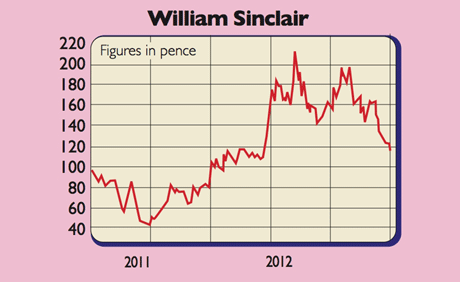Gamble of the week: A washed-out gardening stock
The profits of this garden compost maker have been bogged down in the dreadful weather of last summer, says Phil Oakley. Can the company look forward to brighter times?
Get the latest financial news, insights and expert analysis from our award-winning MoneyWeek team, to help you understand what really matters when it comes to your finances.
You are now subscribed
Your newsletter sign-up was successful
Want to add more newsletters?
For William Sinclair which makes J Arthur Bower's composts 2012 was a washout. The firm needs people to be in their gardens using its composts, soil improvers, lawn products and weed killers but the wet summer kept us indoors, and Sinclair's profits were all but wiped out.
As if that wasn't bad enough, the government wants to stop the use of peat in the gardening and commercial growing markets. Peat harvesting releases trapped carbon dioxide into the atmosphere, contributing to global warming.
This is a worry for Sinclair, which owns quite a few peat bogs, and uses peat extensively in its products. These problems have combined to hammer the share price, which has hit a one-year low of around 114p, having been as high as 200p last April. But I think the pessimism baked into the share price could be a good opportunity.
Try 6 free issues of MoneyWeek today
Get unparalleled financial insight, analysis and expert opinion you can profit from.

Sign up to Money Morning
Don't miss the latest investment and personal finances news, market analysis, plus money-saving tips with our free twice-daily newsletter
Don't miss the latest investment and personal finances news, market analysis, plus money-saving tips with our free twice-daily newsletter
Wet weather hurts Sinclair in two ways: people buy less of its products, but it also makes it very hard to harvest peat. If the company cannot find a reliable source of dry peat, it must buy it from overseas or invest in peat-drying machines.
William Sinclair (LSE: SNCL)

This costs money and eats into profit margins. But every cloud has a silver lining. With peat in short supply, Sinclair has raised its selling prices. While it doesn't expect to recover all its lost business, this should help it recover some of its lost profits. Higher peat prices should also increase the value of its peat reserves.
However, the most interesting part of the business is the growth of peat-free alternative products. The company has invested heavily in land, plant and machinery to make SuperFyba'. This is made by taking the contents of council garden waste bins and turning it into soil improvement products that do a similar job to those using peat.
Sinclair can grow this product quickly. Recent investments have doubled its production capacity and given the company industry-leading levels of efficiency. SuperFyba should account for a growing chunk of sales in future, and leave it less exposed to Britain's weather.
And while peat will be phased out, it will take time. There aren't enough peat-free alternatives to supply the whole market yet, especially commercial growers. So, as long as British summers do not stay permanently wet, there are good reasons to believe that Sinclair's profits can both recover, and grow over time.
At 114p, the shares trade on just under ten times forecast profits for 2013, and the company finances are in reasonable shape. The dividend was recently cut by 27%, but on a maintained payout in 2013, the shares still offer a respectable yield of 5.5%. Buying unpopular shares like Sinclair always requires a belief that the good times will return but they look worth the gamble.
Verdict: SPECULATIVE BUY
Get the latest financial news, insights and expert analysis from our award-winning MoneyWeek team, to help you understand what really matters when it comes to your finances.
Phil spent 13 years as an investment analyst for both stockbroking and fund management companies.
-
 Three Indian stocks poised to profit
Three Indian stocks poised to profitIndian stocks are making waves. Here, professional investor Gaurav Narain of the India Capital Growth Fund highlights three of his favourites
-
 UK small-cap stocks ‘are ready to run’
UK small-cap stocks ‘are ready to run’Opinion UK small-cap stocks could be set for a multi-year bull market, with recent strong performance outstripping the large-cap indices